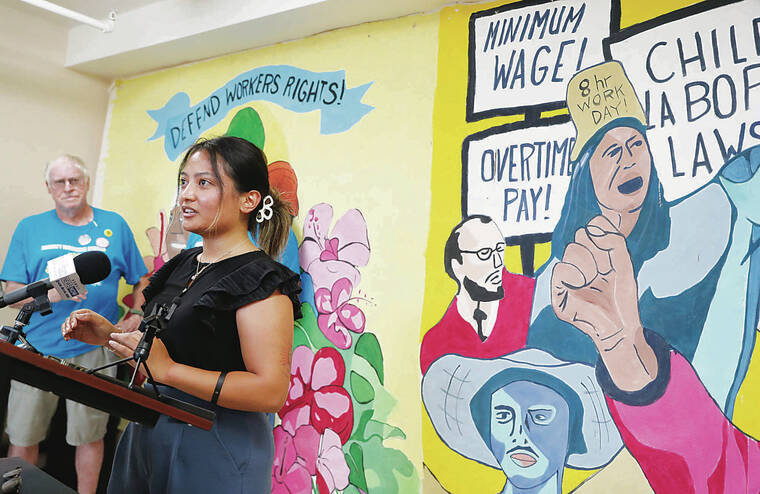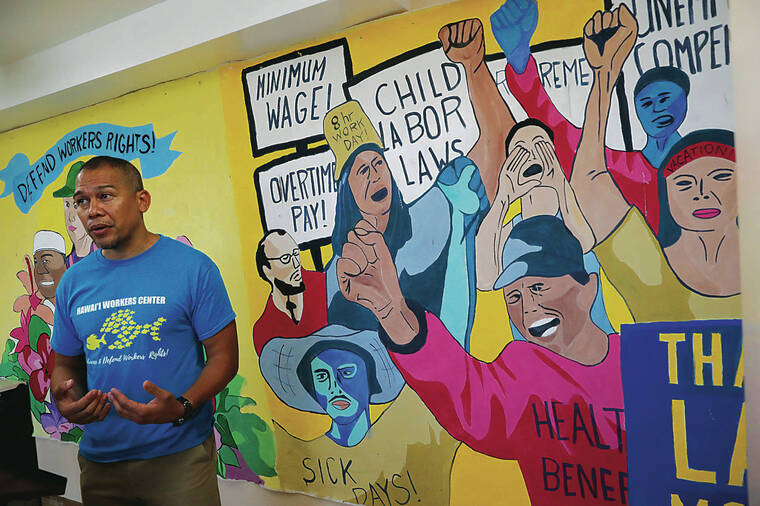Over 20 workers from the two Max’s of Manila Restaurant locations in Hawaii will receive more than $307,000 in back wages and damages after a U.S. Department of Labor investigation found that kitchen staff were not paid required overtime rates.
The case, which was initiated by the Hawaii Workers Center’s Restaurant Workers United program, won $153,885 in overtime wages and $153,885 in damages for a total of 23 employees from the restaurant’s Waipahu and Dillingham restaurants.
An additional $8,418 in civil money penalties for the “reckless nature” of the violations was also assessed against the chain.
“It’s a victory,” HWC executive director Sergio Alcubilla said Friday at a news conference at the group’s Kalihi office. “We feel vindicated that the Department of Labor came out with such a hefty penalty and the results of their investigation.”
The Labor Department investigation found that the 23 cooks and servers were labeled as members of the “managerial team,” and were paid fixed salaries that excluded them from overtime pay despite the number of hours they worked. Staff often worked 60- to 70-hour work weeks, with many working six days a week, according to the workers center.
“They know that they are working long, long hours,” HWC organizer Nelson Salvador said, translating for a current Max’s of Manila worker who requested anonymity for fear of retaliation.
“Many restaurant employers in Hawaii and elsewhere in the nation continue to shortchange workers and deprive them of their hard-earned wages,” Terence Trotter, the Labor Department’s district director for labor wage and hour division, said in a news release. “The restaurants failing to pay employees in compliance with the law will pay a hefty price in back wages due plus liquidated damages.”
The investigation also found that the employer unlawfully allowed a manager to take a portion of tips earned, violating federal law.
Maria Rallojay, who worked as a server at the Waipahu Max’s of Manila location from July 2019 to January 2023, was volunteering with HWC when she informed staff of possible fair labor violations and workplace conditions at the restaurant in 2022.
“I saw firsthand the dedication and the hard work that my colleagues put in daily at the restaurant,” Rallojay said. “It became clear to me that their situation wasn’t just about long hours and hard work. It was about fundamental fairness and respect for their rights as employees.”
After Rallojay brought the possible exploitation conditions to HWC’s attention, Alcubilla said the organization and the state Department of Labor started talking with the workers. When the state Labor Department heard what was going on, they advised HWC to go to the federal department.
The federal investigation began in spring 2023, with findings coming out in January.
While the investigation was recent, Rallojay said, this case began decades ago for affected workers.
HWC’s Alcubilla said many Max’s of Manila workers had wanted to return to the Philippines to visit their families but were unable to travel because of their work schedules.
“At times, they are not thinking about the pay,” said the anonymous employee, who worked as a cook for many years. “They’re just working and working, and getting the pay that they have and sending it to their families.”
Since the investigation, the workers involved in the case were changed from salaried to hourly employees. However, Alcubilla said HWC’s work still isn’t done in pushing for fair compensation.
“When you go back to hourly (wages), one of the things (workers) were saying was that they feel they’re kind of worse off, because if they’re sick, they’re not gonna get paid for it,” Alcubilla said. “When (the workers) computed their hourly (wage), it’s between $18 to $20 for some of these cooks. Considering the amount of money that they bring into the restaurant and the amount of hours they work, they still feel like it’s not fair.”
Rallojay also said she is not satisfied with the compensation the workers received, especially given that the affected workers were only owed back wages for the last three years, and many have been working at the restaurant for decades.
“I feel like they deserve more than what was given,” Rallojay said. “The amount of time they lost visiting family, going back home, relaxing. You cannot see the loss.”
But HWC officials said winning some of the back wages for the workers was still a victory.
“We want to make it a statement that we are watching (the restaurant), that anything that happens to the workers will be dealt with by whatever needs to be done,” Salvador said. “We don’t hate Max’s as an establishment that serves Filipinos. We love them, but we want them to be responsible in their actions, especially when it comes to their workers.”
“The immigrant experience is about building a better life, and this also includes ensuring that our workplaces are fair and just,” Rallojay said.




